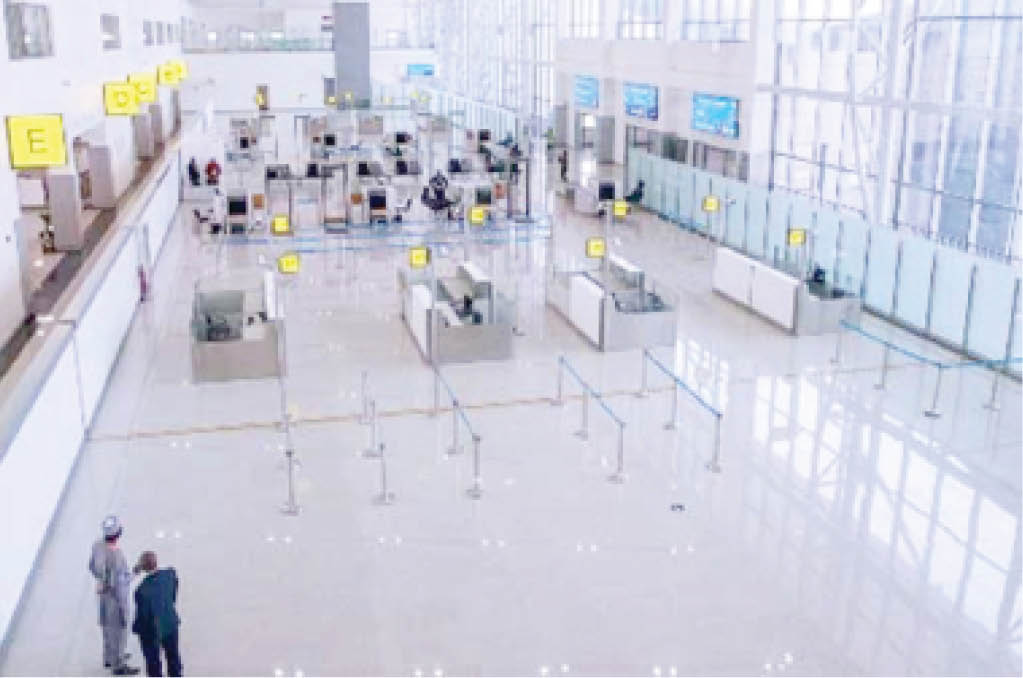Aviation workers are unrelenting in their opposition to the proposed concession of four major international airports.
Amidst the insistence of the Federal Government to go ahead with the plan, it remains to be seen if the unions’ opposition could force the government to reverse itself. Daily Trust on Sunday analyses the situation and reports.
- ‘Aviation suffering instability over policy flops’
- Aviation ministry, agencies peg N4bn for accommodation
From 2015 when the Muhammadu Buhari administration kicked off, the concession of airports in the country has been a key component of the roadmap for aviation development, unfolded by the Minister of Aviation, Senator Hadi Sirika, who was once a minister of state.

Those slated for concessioning are the four major international airports in the country – the Murtala Muhammad International Airport (MMIA), Lagos; Nnamdi Azikiwe International Airport, Abuja; Mallam Aminu Kano International Airport, Kano, and Port Harcourt International Airport.
But from day one, the unions in the industry have rejected the programme, which they say is not in the best interest of the country.
The unions, which have been at daggers-drawn with the Federal Government, are the National Union of Air Transport Employees (NUATE), Air Transport Services Senior Staff Association of Nigeria (ATSSSAN), Association of Nigerian Aviation Professionals (ANAP) and the Nigerian Union of Pensioners (NUP).
They, however, took their opposition to another level when they recently held a nationwide peaceful demonstration against the concession plan. They have also been able to secure the support of their umbrella organisation, the Nigeria Labour Congress (NLC), which has risen in their defence on the rejection of the concession plan.
NLC’s Position
The president of the NLC, Comrade Ayuba Wabba, said it would be unpatriotic to give out airports, which he described as “national assets,” to private investors.
Wabba said, “It is important to note that while our airports, especially the ones earmarked for concession, were in bad states, no private sector invested money towards its rehabilitation.
It would be a grand insult to the collective intelligence of the Nigerian public for the Federal Government to invest a lot of public funds into the reconstruction and rehabilitation of our airports and then hand them over to private sector players for profit maximisation and at the expense of the tax-paying public. This is unjust. It is immoral. This cannot stand.”
He said the NLC would do everything legally within its capacity to resist Federal Government’s plan to concession any viable airport in the country. He, however, adding that they would not oppose any plan to hand over moribund ones to private sector players.
Speaking in a telephone interview with one of our correspondents, Wabba argued that these airports had already been renovated with taxpayers’ money; hence handing them over to individuals would amount to the “highest form of corruption.”

He said, “Unfortunately, the Federal Government is concessioning only the four airports, which are the viable ones. What they are generating is more, and it is the money they are using to sustain non-viable ones.
“The question we are asking is: Why do they have to concession these airports because they are viable already. This is the same way we did to ports. We only gave them to friends and cronies; and today, we are crying of shortage in revenue. People are losing their jobs; and importantly, those that got this concession are smiling to the banks.”
In an official letter dated October 8, which was sent to President Muhammadu Buhari, the labour leader warned that the N100 billion the airports generated annually may reduce drastically if government concessioned it. He added that the concession arrangements flouted the procurement Act as spelt in the 1999 Constitution (as amended).
“They have not been able to share with the public, who is actually the concessionaire? Who do they want to concession it to? What expertise do those unnamed people have? It is this same mistake we made in the power sector. You concession to people, and at the end of the day, few people are smiling to the bank and the services have not improved.
“In the case of airports, all the infrastructures in the airports have been upgraded with our money. Then you want to hand them over to someone for 25 years, even when you are outside government? You shouldn’t leave burden and responsibility to people.
“Why can’t Nigeria look into what is happening in South Africa? Why do you want to concession it to few people? Why didn’t you allow Nigerians to buy shares into the management of the airports so that it would be owned by Nigerians, not few friends and cronies?’’ he queried.
When reminded that those who would get the concession might be Nigerians, Wabba said, “They are not Nigerians as expected, but few friends and cronies. Is it not this same government that wants to reverse the ones that were done in the ports? If they are already viable, why can’t you give the ones that are not viable?
“The viable airports alone generate billions for Nigeria. Government should go and look for the airports that are not viable and start from there. Why do they want to concession the most viable ones?
“It is out of patriotism that we are doing this. If it is this same government that wants to reverse the one of the ports, I wonder why it is still considering concessioning the airports, knowing full well that we are losing billions at the various ports were concessioned. Do you know how much we are losing at the ports? Everybody knows what is happening at the ports.
“For instance, it is becoming harder for many countries around the world because that is their main stake. Why are our ports very expensive now? People prefer to take their goods through Benin Republic. Are you not aware? Our ports are too expensive, basically because they leased them out to their friends – some for 30 years, some for 20.’’
He further said, “The Nigerian constitution states that we should not concentrate our wealth in the hands of few people. It is a clear provision. Our constitution is against concessioning and privatisation. It states that if you want to concession or privatise, give to Nigerians.
“We have a better understanding and example of how Ethiopia is managing their airways. All the families in the country have shares in the Ethiopian Airways, the same with South African ports.”
The Fears
Daily Trust on Sunday also gathered that the concerns of the unions largely stemmed from the issue of welfare of workers and what becomes of thousands of their members after the airports are given to private hands.

The general secretary of the NUATE, Comrade Ocheme Aba, argued that instead of concessioning the existing airports, government should adopt a green field model, which empowers new investors to deal on fresh ventures, such as construction of new runways, terminal buildings and so forth, to be operated for a specified period of time.
They added that the Federal Airports Authority of Nigeria (FAAN) “can be corporatised, in which the Federal Government shall retain 45 per cent equity share, while the remaining 55 per cent is broken down for public acquisition.”
But the Federal Government is also unyielding in its plan. On July 23, 2020, the Federal Ministry of Aviation received a record four certificates of compliance or Outline Business Case (OBC) certificates on the concession of four international airports.
Presenting the certificates to Minister Sirika, the director-general, Infrastructure Concession Regulatory Commission (ICRC), Mr Chidi Izuwah, an engineer, said the ministry could go ahead to look for private investors for the terminals.
Izuwah said the OBCs showed that facilities were bankable and the private sector could invest in them. After the OBC, the next phase is the procurement stage and the Final Business Case (FBC), which will be approved by the Federal Executive Council (FEC) and the ICRC.
He said, “The execution of this project is meant to help Nigeria reach its objective, in terms of air transport value chain growth, by developing and profitably managing customer centric airport facilities for safe, secure and efficient carriage of passengers and goods at world-class standards of quality.”
The ICRC director-general also said the OBC report for the concession of the Lagos, Abuja, Port Harcourt and Kano airport terminals under public-private-partnership (PPP) arrangements was transmitted to the commission on June 1, 2020 for certification.
He said, “In line with the ICRC pre-contract regulatory role, the commission has reviewed the OBCs. We have deduced that the cases substantially satisfy the requirements of the Establishment Act, 2005 and the national policy on public-private-partnership (N4P).”
But the minister of aviation has consistently clarified that the airports, which he said remained national assets, are not for sale. He said only the terminals would be privatised to attract the right investments to drive infrastructural upgrade and renewals.
“The assets still belong to Nigerians, but they will be given to the private sector for efficient management and optimisation,” he said, adding that government has spent a lot of money on the airports and it is important that they are better optimised.
According to a document seen by Daily Trust on Sunday on the concession strategy, it is designed to be terminal, with majority of the revenues derived from non-aeronautical sources. All other facilities at the airports and existing concessions outside the terminals will still be managed by the FAAN, it was learnt.
In addition, the concessionaire is expected to provide the investment required to upgrade the existing terminals, take over the new terminals and maintain them over a period of time to be determined based on financial assessment of each transaction.
Also, the proposal on the concession indicates that the passenger service charge (PSC), which is a major revenue source at the airport will be shared by the FAAN and the concessionaire, while FAAN’s share would be paid directly to by the International Air Transport Association (IATA).
The director of public affairs, Ministry of Aviation, Mr James Odaudu, insisted that the unions had been part of the process from the beginning. He also allayed the fear of workers over job losses.
He said, “Concession is a policy of the government designed in the interest of 200million Nigerians, and will not be truncated for some selfish reasons
“Were the unions sleeping when a past government dissolved the Nigerian Airways and workers were rendered jobless? It took this administration to address the payment of their entitlements. Do they believe this government would want to create the same problems it solved?
It is the first time Labour unions would be involved in a process like this. And it is reflective of the minister’s recognition of Labour and the desire to be as democratic as possible. There’s no law or requirement for Labour to be members of the project delivery team, but the minister included them to show how transparent the process is.
Why didn’t they go on strike when the minister ordered the clearance of almost 11 years of promotion arrears?’’ He asked.
He continued, “Labour leaders met with the minister about two weeks ago, where, for the umpteenth time, he assured them that rather than lead to job losses, the concession would create more revenue for the FAAN, with less maintenance responsibilities.
The minister also gave them an assurance that there would be no job losses. What else do they want? Why are they not telling their members the truth? Do they have personal interests to protect?’’
But the chairman of the NUATE in Abuja, Comrade Ahmed Yusuf, said the process had not been transparent. “While we were in a lockdown, the minister of aviation surprisingly received OBC certificates for the concession of the four most viable airports out of the 22 in Nigeria. This came as a surprise and an insincere act. It lacked transparency, and members of staff were not carried along.
“We totally reject the concession because it is not transparent. If the four viable airports are concessioned, the remaining 18 will die because these four airports sustain the other ones. It is a disaster waiting to happen, and definitely, jobs will be lost. The Lagos airport alone can sustain the 22 airports, so why the concession?” he asked.
Experts call for caution
While workers oppose the concession of the airports, other stakeholders in the industry support it, provided the process would be transparent and hitch-free. They cited an instance of the concession of the Murtala Muhammed Airport terminal two (MMA2) to the Bi-Courtney Aviation Services Limited (BASL), which has been a subject of unending litigation and controversy.
This is why experts believe there is the need to be more circumspect in the proposed concession to avoid a repeat of the MMA2 experience. They also called on the Federal Government to resolve the lingering issues with the MMA2 concession to boost the confidence of would-be investors.
“Concessioning is controversial. Doing it badly is worse than not doing it at all. Concession is a logical way, from my perspective, but the big challenge is to do it transparently and well,” a former secretary-general of the African Airlines Association, Mr Nick Fadugba said.
The House of Representatives Committee on Aviation recently called on the unions to present their grievances against airport concession to the National Assembly. How far can the intervention of the lawmakers go in calming the angry workers? Only time will tell.

 Join Daily Trust WhatsApp Community For Quick Access To News and Happenings Around You.
Join Daily Trust WhatsApp Community For Quick Access To News and Happenings Around You.


